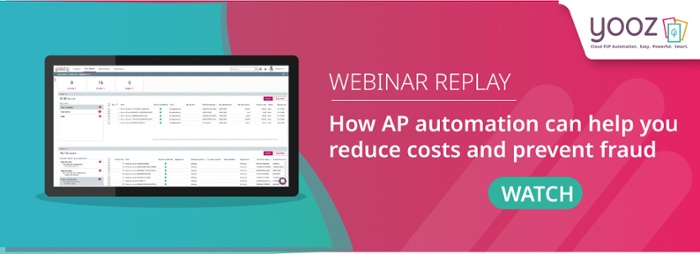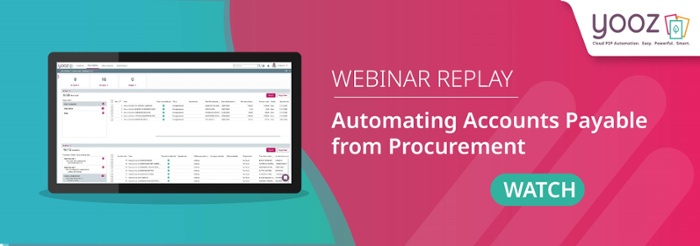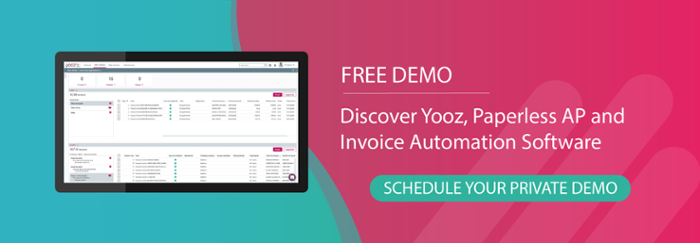Every industry has its own unique ways of handling invoices, and the construction business is no exception. It’s an industry characterized by low margins, slow payments, high overhead, and a reliance on credit to complete most projects. What’s more, daily operations pose a special challenge as team members who have to keep tabs on accounting and cash management are often on the go, driving from one job site to the next.
Proper and timely accounting processes are crucial to managing suppliers and paying invoices, all in order to finish projects on time and on budget and eventually turn a profit. Automated invoice processing for construction accounts payable is one proven way to accomplish these goals as it takes most of the guesswork and uncertainties out of the invoicing and payments process by reducing mistakes, errors, and delays in addition to saving time and money. And it does so throughout each stage of the entire invoice management workflow.
How An Automated Payable Invoice Process Simplifies Billing
How is invoice management different in construction?
Unlike many industries, the construction industry has three related but distinct billing options. First, there’s advanced billing (the billing that happens before a project begins). Second is arrears billing (what happens at the end of the project) and third, progress billing (which occurs as the project progresses). Each type of billing option has its advantages and risks.
Take advanced billing. When payments are finalized before a project begins, often as a lump sum payment, contractors enter into a risky arrangement in case the budget runs over. If that likely scenario is not part of the initial contract, they risk working for free to complete the job. To agree to advanced billing, then, is a matter of trust and works best for projects with a short duration and for parties that have done a lot of work together.
Arrears billing follows the opposite pattern. No invoices will hit the accounting department until the completion of a job. While that’s a good way for a contractor to gain credibility with a new client, it means carrying the costs for a project for its entire duration. This has the potential to expose some stakeholders to a cash crunch, especially with concurrent processes and projects.
In this scenario, contractors will need to cover expenses for labor and materials, counting on their clients to at one point pay fully and on time. Knowing that it takes sometimes months in the industry to send out invoices, arrears billing is only advisable for contractors with a strong cash flow position working on shorter projects with a manageable budget.
Finally, there’s the delicate dance of progress billing, a popular method of settling charges. Contractors who follow this practice generate their invoices based on the percentage of work completed by a certain date. Payments are made at agreed-upon points as the project comes along, for instance a 10% tranche coming due once one tenth of the work is done.
Progress billing works best when the various stakeholders agree on basic details such as due dates, the relevant percentages of work completed and, arguably most important, a payment schedule that details when invoices should be submitted and paid. The clearer a contract spells out the payment schedule, the fewer misunderstandings and arguments will follow when problems arise.
In all three scenarios, the invoice process requires tracking and attention to detail. Equally important, the business needs to know what is happening and where at all times. These are all part of the standout traits of the payable automation process. This means that, regardless of the billing option a construction business chooses, implementing Accounts Payable (AP) automation from purchase to payment can improve day-to-day operations and help boost both their bottom line and competitive position.
AP automation also creates a positive cascade down the entire supply chain. Suppliers who know they’ll get paid on time every time are much more likely to work with your company and make sure that you won’t be affected by materials or labor shortages.
Considering the rising prices thanks to inflation and availability issues, making sure that invoices are processed quickly and accurately (then paid on time) is increasingly more crucial. With many materials in short supply and companies of all sizes are competing for the same products, customer relationship management can supply the competitive edge.
Laying a Solid Foundation for Growth
In addition to customer relationship management one of the great things about Accounts Payable automation - especially cloud-based - is that it isn’t just for the big guys. Thanks to easy scalability, automation software yields tangible benefits for construction businesses of any size, helping them manage industry-specific billing practices such as retention and lien waivers.
Security also plays a large role. When team members work out of their truck, skipping from one job site to another, they need a proven and secure way to receive and manage invoices from multiple suppliers and subcontractors. They should not be hampered by being mobile when it comes to assigning invoices to the right projects and then reviewing and approving them without delay, all with safeguards in place to help protect against errors and fraud. Since optimal cash management is so important, accidentally paying an invoice twice or overpaying for materials can quickly push a company into the red and wreak havoc on a construction project with many parties involved that all rely on each other’s timely performance.
Finally, intelligent payable automation also gives contractors and their suppliers visibility into the status of their invoices, freeing all parties from hunting for documents and payment status. The bottom line is an 80% reduction in processing costs and dramatically shorter cycle times, measured in days instead of weeks.
From Capture to Payment: The Steps of An Automated Payable System
Now let's take a closer look of how automation implements best practices for construction invoice processing.
Invoices and purchase orders are captured as they come in whether they’re submitted on paper, by fax, as an email attachment, or another machine-readable form.
Thanks to Optical Character Recognition (OCR), the system will transform paper or fax invoices into a structured file. It will automatically split batches of documents into individual invoices and properly assigning them to the right projects and GL codes. This means that handling invoices for multiple suppliers and subcontractors working on multiple projects is no longer a hassle.
Next, state-of-the-art robotic process automation and machine-learning software goes to work and reads all documents, extracting and indexing all relevant information. Once details such as due dates, amounts, invoice number and bank account information are extracted and securely stored in the cloud, the software will then conduct a verification process using three-way matching.
This process checks the newest data points against what's already on file (or not), such as a contractor’s bank account and existing purchase orders for materials. This is yet another step that ensures a reduction in errors and a streamlined process.
Once an invoice passes through this three-way matching stage, it will automatically be routed to the right person for review and approval. Should it not pass the stage and be flagged as an issue, the system will automatically route it to the designated person for further review.
All this information - each step of the entire payable process - is securely stored in the cloud and searchable by keyword. That puts the power to make smart decisions in the palm of your hands. The invoice process is a goldmine of information including checking notices of goods received or purchase orders, reviewing any relevant lien waivers or retention documents, or even identifying your most consistent issues.
When all the information from every purchase order and invoice is just a click away, companies of any size can do cash management and project management in real-time.
In general, payable automation creates straight-through invoice processing that operates 24/7 with no human intervention required.
Not A Cloud in Sight (But Still There)
Invisible, cloud-based automation doesn't mean that the benefits aren't easily viewed. From anywhere.
The ability to be mobile means that team members can perform their review and approval process from anywhere, anytime on a mobile device of their choice. There are no processing delays caused by sitting in a construction trailer at a job site, having a few minutes in their truck between meetings, or even at home feeling ill.
However, if needed, the construction invoice processing workflow is also extremely agile: it can be quickly adjusted to meet changing workplace requirements, for instance when a team member is temporarily unavailable or a new person has to be quickly onboarded to handle the review and approval process.
Pay All Your Invoices On Time, Every Time
A complete payable automation process doesn't stop with approval. In fact, the same ease of use applies to initiating payments on time and with the proper security safeguards to minimize fraud. This means a significantly shorter payment process for an industry traditionally plagued by very long payment cycles.
Thanks to payment module options, suppliers and subcontractors can be onboarded with a single email address and only have to choose their preferred payment method. Invoices will be paid on time in order to lock in any early payment discounts and avoid late fees. The AP team only has to select single or multiple invoices to be paid, choose a full or partial amount according to the billing option they have agreed on with suppliers or subcontractors and finally pick a manual or automatic payment schedule. All those selections happen in the same intuitive interface as the rest of the invoice workflow.
Finally, before payments go out, the platform performs one more round of checks to prevent errors and fraud, including volume and velocity checks. If a construction business and its partners choose to settle its invoices by virtual credit card, it can also generate valuable cashback from each invoice.
The result? Easily and flawlessly managing your invoice workflow across multiple sites and multiple projects.
Why Automated Invoice Processing is a Game Changer
Automated invoice processing can truly be a game changer for construction invoice processing. It unlocks all the benefits of mobile work, while sacrificing nothing in terms of functionality, security, and reliability. It provides an opportunity for businesses of any size to grow and compete at the same level as much larger competitors without paying exorbitant costs. Think of intelligent AP automation as laying the foundation for your continued growth and success, one invoice at a time.
FAQs
How does Yooz's invoice processing solution cater to the unique needs of the construction industry?
Can Yooz's invoice processing solution automate the handling of various types of construction invoices, including progress billing, change orders, and subcontractor invoices?
How does Yooz's invoice processing solution ensure accuracy and compliance with regulatory requirements in the construction industry?
Can Yooz's invoice processing solution integrate with construction management software and accounting systems commonly used in the industry?

.jpg)





